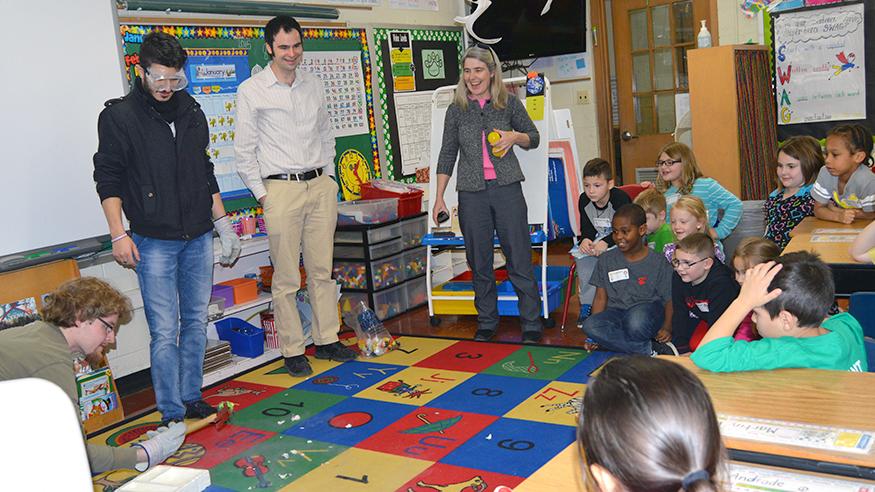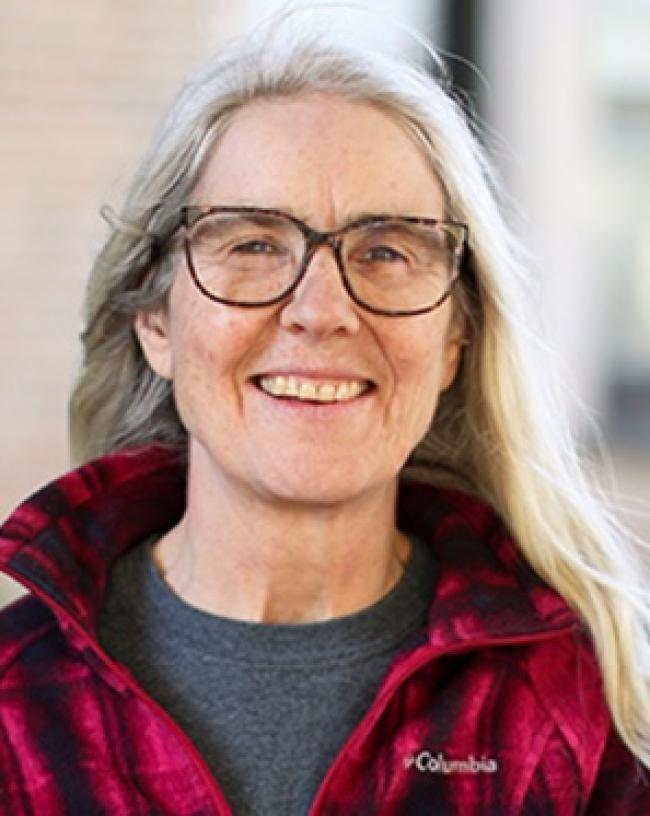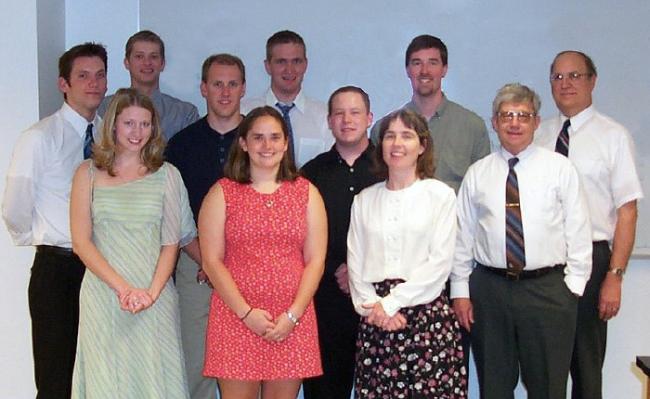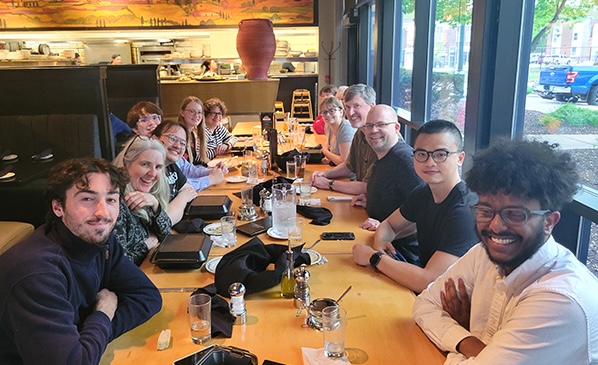
Physics professors Dr. Cecilia Vogel and Dr. James Van Howe have led many classroom demonstrations. Here, Augustana students Robert Holmquist '16 and Abdul Rahman Merhi '15 show how freezing rubber ducks in liquid nitrogen make them so brittle that they shatter like glass when smashed with a hammer. (2015 photo)
Celebrating a trailblazer: Dr. Vogel’s impact in physics reaches beyond campus

Dr. Cecilia Vogel
When Dr. Cecilia Vogel arrived at Augustana College to teach physics in 1992, she was a rarity.
Only about 14% of the 1,200 physics doctoral degrees granted in her year went to women. And of those degree-holders, only a fraction went on to teach.
When she joined three men on the physics faculty that year, her presence shot Augustana’s percentage of women faculty up to 25%.
She didn’t make a big deal out of it.
“As the only female physicist at Augustana for many years, and one of few female physics faculty in the country, I tried to carefully toe the line,” she said. “I wanted to especially encourage women physics and engineering majors. However, I wanted to avoid making female students feel singled out.”
And they did not feel singled out. They felt encouraged. Their reflections upon Dr. Vogel’s retirement this year make that clear.
“It absolutely made a difference to have a woman on the physics department faculty,” said Georgia Votta ‘21, a physics graduate student at Michigan State University. “There weren’t many other women who were prospective physics majors when I visited Augustana as a high schooler — I remember feeling reassured when I met Dr. Vogel. It was a big factor in my decision to attend Augustana and remained very important to me as I progressed through my degree.”
Dr. Vogel said she tried to foster an environment where it would feel normal for women to be interested in the physical sciences.
That worked for Dr. Karen Andeen ‘03, associate professor of physics at Marquette University, who came to Augustana with a physics major in mind.
“I think what was really important about Dr. Vogel was, I didn't think that being a woman in physics was weird,” she said. “That actually never occurred to me until I went to grad school.
“I think what was really important about Dr. Vogel was, I didn't think that being a woman in physics was weird. That actually never occurred to me until I went to grad school."

2003 physics majors with faculty – from the left, first row: Karen Andeen, Kristin Hanekamp, Dr. Cecilia Vogel and Dr. Bruce McCart; second row: Adam Geske, Bob Hoffmann, Ryan Erickson, Kevin Murphy, Pat Watts, Dr. Lee Carkner and Dr. David Renneke
“Our classes were so small at Augustana, and there was one woman and three guys on the faculty. So actually, as a student, I didn't really know that the situation was so bad in physics, and I might not have continued on if I had been presented with an all-male faculty.”
The representation of women in physics has risen in recent years to about 20%, but Dr. Vogel said that it’s not something she spends much time thinking about.
“There is no reason that there should be any difference in representation of gender identifications in physics,” she said.
However, an aspect of her life outside of class may have had the biggest impact on Dr. Andeen, who occasionally would see Dr. Vogel and her husband and children playing basketball at PepsiCo.
“And I thought, that's kind of what I want one day,” she recalled. “I want a career. I want to be a physicist. I want to have a family and look, you can do that, right? Yes!”
Dr. Vogel showed her it could be done.
After six years at Augustana, Dr. Vogel received tenure and in 2009, she was promoted to professor. In the 33 years she has taught at Augustana, she kept up with advances not only in her field, but also in teaching.
“She helped to bring new physics teaching techniques to Augustana and worked to embrace the revolution in physics teaching that was happening in the 1990s,” said Dr. Lee Carkner, professor of physics.
“She incorporated new active learning techniques into the classroom where students would work directly with discussions, exercises and laboratory activities to learn physics with hands-on work. Cecilia would work to come up with a new or clever way to get across complex physics concepts in ways that were easier for the students to understand.”
She also took over teaching classes that were based on theoretical physics, such as modern physics and quantum physics.
“These are complex, often non-intuitive subjects, and Cecilia taught them in a way that made these topics more accessible and comprehensible to our students,” Dr. Carkner said.
“She helped to bring new physics teaching techniques to Augustana and worked to embrace the revolution in physics teaching that was happening in the 1990s."
Dr. Andeen also worked with Dr. Vogel as her teaching assistant. In between labs and classes, they got to know each other.
“She shared stories about traveling abroad as a student, and learning to drink coffee in Europe, but also I got to see her excitement about the labs we were teaching — or rather, the labs she was teaching, and I was trying to learn more rapidly than the students,” Dr. Andeen remembered. “Working alongside her is, I think, where she impacted me most.”
For most of her career, Dr. Vogel was the advisor for the Augustana Physics and Engineering Society (APES), which has been named an outstanding chapter at least 15 times by the national Society of Physics Students.
Augustana’s APES members have conducted grade-school classroom demos, Science Night participation, physics and astronomy open houses, summer classes for junior high girls, after-school programs, public library presentations and high school robotics team mentoring.
“I must give most of the credit to amazing students who have come through the program!” said Dr. Vogel. “As for my part, again it was a careful balance. I was there to help the students as needed and to provide continuity from year to year.
“On the other hand, I had to let the students be in control of the success or failure of each project, since that is the only way for them to learn to be responsible leaders and feel the accomplishment of achieving goals.”
Tom Foss ‘06, a high school science teacher in Newark, Ill., said Dr. Vogel had more influence on his choice to pursue a career in education than anyone else. His participation in APES also was key.
“It was my experience assisting with demonstrations and explaining physics concepts to kids that gave me the education bug,” he said. “I doubt that I would be in a classroom now if not for Dr. Vogel.
“She has a genuine love for science, something that was as apparent watching her demonstrate her quantum entanglement experiment last year as it was watching her demonstrate bicycle wheel physics in my introductory class. She has a knack for finding new and interesting ways to explain and illustrate even the most difficult concepts, a skill I think every science educator constantly strives to master.”
Dr. Carkner said that she always encouraged students to think about how their physics major could be used outside the classroom.
“We have one of the best physics clubs in the country,” he added. “It has been a great experience for our students, and Cecilia is the one who has made that happen.”
APES members may have seen the lighter side of the serious physicist.
“She was really great about letting us explore our own ideas,” Votta said. “She gave us independence but supported us so we could make those crazy ideas come to life!
“Dr. Vogel is a super fun person. She loved having holiday parties with liquid nitrogen ice cream and games, and having celebrations with lots of food. She makes the best pie! As much time as we spent working together, we spent just as much time laughing and having a good time!”
Foss agreed. “Maybe she's tightened up her standards on who she hands out Dewar flasks of liquid nitrogen to, but I have to imagine she's still telling stories about her goats, dressing up for Halloween and baking batches of cherry chip cookies.”
Building a highly successful student club and enlightening students on the true nature of the universe are two of her legacies, Dr. Carkner said.
Dr. Vogel said she will miss the students and faculty, especially the intellectual challenge of discussions on topics at the limits of human understanding.
“It may be cliche, but every ‘aha!’ that a student has, every question they ask that shows they want to learn more — that is what made my work satisfying,” she said.

Faculty celebrate with students inducted into Sigma Pi Sigma, the physics and astronomy honor society, for 2023-2024.
